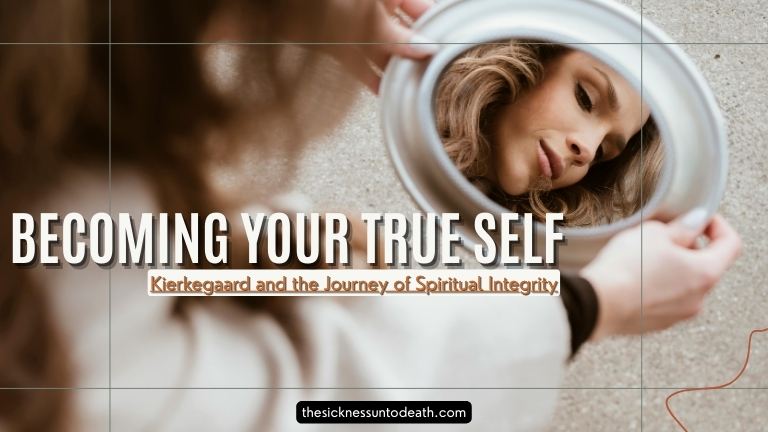Explore Kierkegaard’s belief that authentic selfhood is only possible through a committed relationship with God.
In a world obsessed with self-expression, it’s easy to confuse curating an identity with actually becoming yourself. Social media encourages us to create versions of who we are—versions that are polished, confident, and likeable.
But what if becoming your true self isn’t about expressing something already finished… but about committing to something greater than yourself?
That’s what Danish philosopher Søren Kierkegaard believed.
He didn’t see identity as a fixed label or a personal brand. For Kierkegaard, your true self isn’t something you decide on a whim. It’s something you become—through honesty, inwardness, and above all, a relationship with God.
The Self Is a Task
Kierkegaard famously wrote in The Sickness Unto Death:
“The self is a relation that relates itself to itself… and in relating itself to itself, relates itself to the power that established it.”
It sounds complex, but the meaning is profound.
He’s saying that the self isn’t just something you are—it’s something you’re always becoming. And the only way to become your authentic self, rather than a copy of others or a mask for the world, is to be grounded in the One who created you.
Integrity Isn’t Performance—It’s Alignment
Today, we often measure “authenticity” by how bold or different someone appears. But for Kierkegaard, authenticity was much quieter—and much harder. It meant living in alignment with your values, your convictions, and your relationship with God.
That kind of spiritual integrity doesn’t come from chasing success or pleasing the crowd. It comes from turning inward, asking hard questions, and following truth—even when it costs you.
“To be a human being is not a matter of having two arms, two legs, two eyes. It is to will to be the self which one truly is.”
Why It Matters Now
We live in a time when identity is more flexible than ever—career titles change, beliefs shift, appearances evolve. And yet, people still feel deeply lost. Disconnected. Like they’ve drifted far from who they’re meant to be.
Kierkegaard believed that this kind of despair—subtle, quiet, and persistent—is what happens when we try to build a self without a foundation. When we forget that our truest identity isn’t found in comparison or performance, but in communion with God.
Becoming Yourself Is a Spiritual Calling
Here’s the good news: becoming your true self isn’t about having all the answers. It’s not about perfection. It’s about honestly facing who you are, bringing that before God, and letting Him shape you into who you were always meant to become.
It’s about giving up the exhausting need to impress, and learning instead to live with spiritual integrity—where your inward life matches your outward actions.
Final Thoughts: Becoming Is the Journey
You don’t need to fake it.
You don’t need to rush it.
You just need to begin.
Becoming your true self is not a one-time decision. It’s a daily return to who you are in the eyes of God.
Kierkegaard doesn’t offer easy formulas—but he does offer a path. One that leads not to popularity, but to peace. Not to public applause, but to inner clarity. Not to image—but to integrity.
Go Deeper
📖 Visit www.thesicknessuntodeath.com
Explore a modern translation of Kierkegaard’s The Sickness Unto Death, where he unpacks what it means to be a self, to confront despair, and to live a life grounded in truth.
If you’re tired of pretending, performing, or drifting—this is your invitation to begin the journey inward.
Toward faith.
Toward wholeness.
Toward the you that’s waiting to be discovered.

